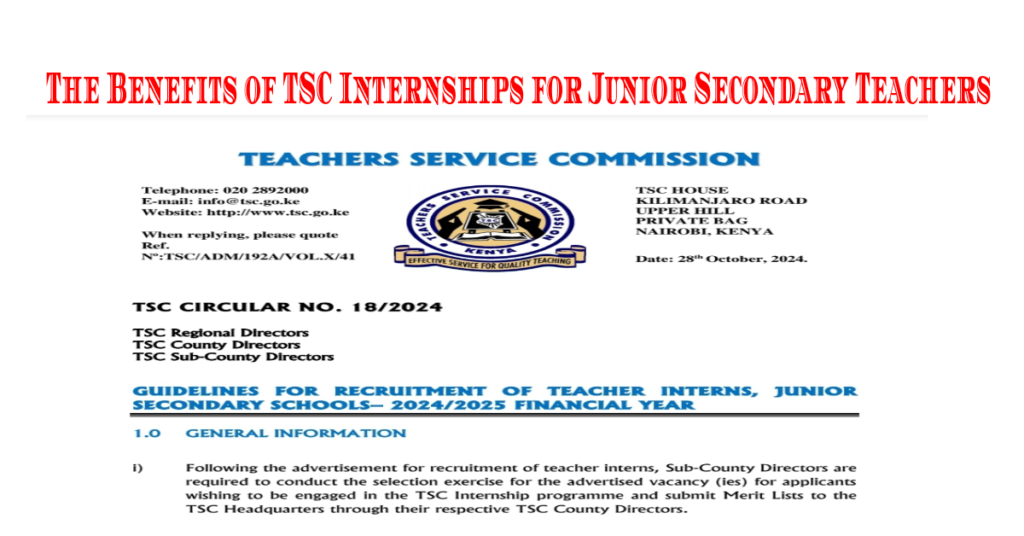The Benefits of TSC Internships for Junior Secondary Teachers: A Pathway to Permanent Employment?


The Teacher Service Commission (TSC) internship program is a significant initiative aimed at enhancing the professional development of junior secondary teachers in Kenya. This program serves as a bridge between academic qualifications and practical teaching experience, which is crucial for individuals seeking to establish a successful teaching career. Designed to provide structured support, the TSC internship enables emerging educators to acquire vital skills and competencies that are essential in today’s dynamic educational landscape.
Internships within the TSC framework are structured to last one year, during which participants are engaged in various teaching and administrative roles under the mentorship of experienced educators. This hands-on training not only allows interns to apply theoretical knowledge in real classroom settings but also helps them understand the day-to-day operations of academic institutions. Such exposure is invaluable as it equips them with the necessary tools to meet the challenges of teaching effectively.
One of the primary objectives of the TSC internship program is to prepare interns for obtaining permanent employment within the education sector. By presenting opportunities for professional networking and skill enhancement, the program plays a critical role in increasing the interns’ employability. Successful completion of the internship demonstrates readiness to engage in substantive teaching roles, marking a pivotal moment in the career journey of an aspiring educator.
The significance of securing a teaching internship cannot be overstated. It opens doors to future employment opportunities and provides candidates with a competitive edge in the job market. Furthermore, the experience gained during the internship aids in building a robust professional portfolio, which is a requirement for many employment applications in the education field. The TSC internship program is, therefore, a crucial stepping stone for junior secondary teachers seeking lasting and impactful careers in education.
Gaining Practical Teaching Experience
Participating in the Teachers Service Commission (TSC) internships offers junior secondary teachers a unique opportunity to gain invaluable practical teaching experience. The program is designed to immerse interns in real classroom settings, allowing them to apply theoretical knowledge in practice. This hands-on exposure is crucial for developing the skills necessary to manage a classroom effectively and cater to the diverse needs of students.
During the internship, participants are placed in schools where they can observe seasoned educators and engage with students directly. This environment fosters a deeper understanding of pedagogical strategies and classroom dynamics. Interns are encouraged to take part in lesson planning, execution of teaching strategies, and assessment of student learning outcomes, which equips them with practical skills that are essential for their professional growth.
Moreover, the TSC internship program includes a structured feedback system aimed at enhancing the learning experience for the interns. Regular evaluations from supervising teachers and mentors provide constructive criticism and personalized guidance. This feedback is crucial as it allows interns to identify areas for improvement and refine their teaching techniques accordingly. The constructive nature of these assessments not only promotes continuous improvement but also cultivates a reflective practice that is vital in the teaching profession.
Furthermore, the intern-mentor relationship plays a significant role in the development of junior secondary teachers. Mentors, often experienced educators, offer insights and support that help interns navigate the complexities of teaching. This relationship fosters a collaborative learning environment where interns can ask questions, share challenges, and gain confidence. Ultimately, the practical teaching experience gained through the TSC internship program serves as a solid foundation for aspiring educators, significantly enhancing their readiness for future employment in the education sector.
Enhanced Employability and Networking Opportunities
Participating in a TSC internship significantly enhances the employability of junior secondary teachers. This experience not only equips interns with practical skills but also provides them with a competitive advantage in the job market. By immersing themselves in a professional teaching environment, interns can build a robust portfolio showcasing their capabilities, adaptability, and effectiveness in real classroom situations. Employers often prioritize candidates who have hands-on experience, as it indicates readiness for the challenges of a permanent teaching position.
Moreover, the TSC internship serves as a valuable platform for interns to forge important professional relationships. During their placements, interns have the opportunity to collaborate with experienced educators, administrators, and other staff members. This interaction can lead to mentorship relationships, where seasoned teachers provide guidance and support, significantly influencing the interns’ professional growth. The connections developed during the internship can also prove beneficial when seeking referrals for future employment opportunities.
Networking plays a crucial role in securing permanent positions. Interns often find themselves in educational environments that are rich with potential contacts and future collaborators. Engaging with colleagues, participating in staff meetings, and contributing to school events allows interns to establish a presence within the TSC community and local schools. These connections can lead to recommendations and job offers, as word-of-mouth continues to be an essential aspect of the education sector.
Furthermore, the relationships fostered during the internship may provide access to job openings that are not publicly advertised. Many positions are filled through internal recommendations, and having established a rapport with professionals in the field can pave the way to these exclusive opportunities. Thus, TSC internships not only enhance employability through skill development but also cultivate a vital network for future career advancement in education.
Personal and Professional Growth
Participating in teaching internships as a junior secondary teacher presents unique challenges that ultimately foster significant personal and professional growth. One of the primary hurdles interns encounter is classroom management, a crucial skill for any educator. Interns must learn to establish authority while creating a welcoming environment conducive to learning. This experience enables them to develop essential strategies that enhance their ability to engage students and maintain discipline, vital components of effective teaching.
Moreover, the introduction and implementation of the Competency-Based Curriculum (CBC) require interns to adapt swiftly to new methodologies and pedagogical approaches. This adaptability not only enhances their teaching techniques but also encourages innovative thinking as they tailor lessons to accommodate diverse learning styles. By navigating the complexities of the CBC, interns cultivate a deeper understanding of educational frameworks, laying a strong foundation for their future careers in teaching.
Another significant aspect of personal growth stems from the resilience interns develop throughout their internship. Real-world teaching experiences often present unforeseen challenges, such as varied student behaviors and the necessity for immediate problem-solving. Through these situations, interns learn to persevere and remain composed under pressure. This resilience is a vital trait for educators, equipping them to handle academic and emotional challenges within the classroom.
In essence, the transformational journey of interns not only equips them with practical skills and knowledge but also profoundly shapes their character. This holistic approach to personal and professional development prepares them for permanent teaching roles, ensuring they are not only competent educators but also adaptable and resilient individuals ready to face the evolving demands of the educational landscape.
Conclusion
The Teachers Service Commission (TSC) internship program emerges as a significant catalyst for junior secondary teachers aspiring to secure permanent employment within the education sector. Throughout this blog post, we have elaborated on various aspects of the TSC internship, highlighting how it serves not only as a professional development opportunity but also as a strategic pathway to permanent teaching positions.
First and foremost, the structured training and mentorship provided during the internship period equip aspiring teachers with essential pedagogical skills and classroom management techniques. This hands-on experience is invaluable, fostering confidence and competence that new teachers need to thrive in the increasingly evolving educational landscape. By immersing themselves in real-world teaching scenarios, interns can develop a robust skill set that enhances their employability prospects significantly.






